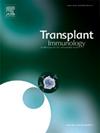Pre-donation statin therapy to improve solid organ transplant outcomes
IF 1.4
4区 医学
Q4 IMMUNOLOGY
引用次数: 0
Abstract
Background
Inflammatory injury in organ donors, particularly after brain death and during ischemia-reperfusion, contributes to graft dysfunction, rejection, and reduced survival. Statins, beyond their lipid-lowering role, exert pleiotropic anti-inflammatory and immunomodulatory effects, including IL-6 suppression, NF-κB inhibition, immune cell modulation, and potential alteration of exosome secretion.
Methods
Building upon this background, this narrative review synthesises preclinical and clinical evidence on pre-donation statin therapy in solid organ transplantation. Specifically, we examine mechanistic pathways, such as cytokine signalling, vascular protection, and exosome modulation, alongside clinical data from heart, liver, lung, and kidney transplantation.
Results
In terms of outcomes, preclinical models consistently demonstrate reduced inflammatory burden, preserved microvascular integrity, and improved graft function with donor statin therapy. Moving to clinical studies, limited randomised controlled trials suggest early biochemical and haemodynamic benefits, such as reduced cardiac biomarkers, lower ALT in liver recipients, and reduced primary graft dysfunction in lung recipients. However, evidence for improved long-term graft survival, rejection rates, or mortality is inconsistent. Most trials are underpowered, single-centre, and lack mechanistic endpoint analysis, and data on donation after circulatory death and living donors remain sparse.
Conclusions
Pre-donation statin therapy is biologically plausible, safe in early studies, and supported by robust mechanistic rationale, yet definitive clinical benefit remains unproven. Large, multi-centre trials incorporating mechanistic and clinical endpoints, such as the ongoing SIGNET study, are essential to determine whether this strategy should be integrated into standard donor management.
捐献前他汀类药物治疗改善实体器官移植结果
背景:器官供体的炎症性损伤,特别是脑死亡后和缺血再灌注期间,会导致移植物功能障碍、排斥反应和生存率降低。他汀类药物除了具有降脂作用外,还具有多种抗炎和免疫调节作用,包括抑制IL-6、抑制NF-κB、调节免疫细胞和潜在改变外泌体分泌。方法基于此背景,本文综述了他汀类药物在实体器官移植中的临床前和临床证据。具体来说,我们研究了机制途径,如细胞因子信号传导、血管保护和外泌体调节,以及心脏、肝脏、肺和肾移植的临床数据。结果:临床前模型一致显示,他汀类药物治疗减轻了炎症负担,保持了微血管完整性,改善了移植物功能。转向临床研究,有限的随机对照试验表明早期生化和血流动力学益处,如心脏生物标志物降低,肝受体ALT降低,肺受体原发性移植物功能障碍减少。然而,改善移植的长期存活率、排异率或死亡率的证据并不一致。大多数试验缺乏动力,单中心,缺乏机制终点分析,并且关于循环死亡和活体供体后捐赠的数据仍然很少。结论捐献前他汀类药物治疗在生物学上是合理的,在早期研究中是安全的,并且有强大的机制理论支持,但明确的临床益处仍未得到证实。包括机制和临床终点的大型多中心试验,如正在进行的SIGNET研究,对于确定该策略是否应纳入标准供体管理至关重要。
本文章由计算机程序翻译,如有差异,请以英文原文为准。
求助全文
约1分钟内获得全文
求助全文
来源期刊

Transplant immunology
医学-免疫学
CiteScore
2.10
自引率
13.30%
发文量
198
审稿时长
48 days
期刊介绍:
Transplant Immunology will publish up-to-date information on all aspects of the broad field it encompasses. The journal will be directed at (basic) scientists, tissue typers, transplant physicians and surgeons, and research and data on all immunological aspects of organ-, tissue- and (haematopoietic) stem cell transplantation are of potential interest to the readers of Transplant Immunology. Original papers, Review articles and Hypotheses will be considered for publication and submitted manuscripts will be rapidly peer-reviewed and published. They will be judged on the basis of scientific merit, originality, timeliness and quality.
 求助内容:
求助内容: 应助结果提醒方式:
应助结果提醒方式:


